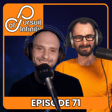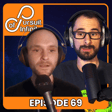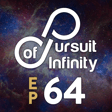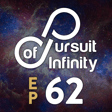Introduction to Nikos Patodakis
00:00:02
Speaker
Hello and welcome to Pursuit of Infinity. Today's guest is Nikos Patodakis, your friendly neighborhood soul doctor and soil doctor.
Pursuit of Happiness and Sacred Meaning
00:00:11
Speaker
Nikos is a brilliant philosopher and educator whose transdisciplinary work arises at the intersection of nature and culture, the sciences, the arts, and the wisdom traditions. He also works with people to help them, as he puts it, with the most pressing problem of all, which is how to be truly happy and successful and how to truly touch the most sacred meaning of life.
Dangerous Wisdom Podcast and Guest Rick Strassman
00:00:35
Speaker
He also has a podcast called Dangerous Wisdom, a brilliant term he coined to encompass the full spectrum of spiritual understanding. Recently he interviewed Rick Strassman, who, if you don't know, is the man who reignited the psychedelic research done in America by studying DMT in a clinical setting.
00:00:55
Speaker
Nikos' podcast is fantastic, and he just so happens to have released a series of episodes surrounding psychedelics, which we resonate with here at Pursuit of Infinity.
Philosophy and Humanity's Crises
00:01:06
Speaker
Nikos and I discuss philosophy, the crises that we face as humanity, the pandemic and the learning experiences it will hopefully provide for us, and more.
00:01:16
Speaker
This was truly one of my favorite conversations ever. He has an unbelievable breadth of knowledge and wisdom and a sense of wise compassion that really resonates with us here at the pod.
00:01:27
Speaker
But before we get to it, show us some support if you like what we do. The easiest way to do that is to subscribe and leave us a five star review on your platform of choice.
Community and Support
00:01:37
Speaker
And if you're feeling extra altruistic, you can become a patron at patreon.com slash pursuit of infinity. We're also on Instagram. So give us a follow there and reach out at pursuit of infinity pod.
00:01:49
Speaker
We have some exciting stuff coming, including our YouTube
Thinking Like Nature
00:01:52
Speaker
channel. So stay tuned. And without further delay, please help me in welcoming Nikos Padadakis.
00:02:24
Speaker
Hello Nikos and welcome to the show.
00:02:26
Speaker
Thanks for having me, Josh. Glad to be here. I appreciate it. I'd like to start by discussing a quote. So I was reading that you're a former negotiation trainer and consultant for Fortune 500 companies and that you were, quote, helping professionals of all kinds learn to think the way nature works. So what exactly does that mean? What does it mean to think the way that nature works?
Wisdom vs. Ignorance
00:02:54
Speaker
Oh, that's, that's, that's a key question. I think that's marvelous. Now I would have, I have to confess that at the time when I worked in corporate America, I didn't understand that. So that's one of the reasons why I was perfectly happy to leave. And I was only there because I was.
00:03:11
Speaker
I wanted to kind of get into the mess of the world a little. A lot of philosophers today, and we could make, first of all, make a distinction. Thoreau said that there are nowadays professors of philosophy, but not philosophers. And Pierre Adot, who was a French philosopher, did a lot of work on how
00:03:29
Speaker
the ancient philosophical traditions in our own lineages here in the dominant culture. We used to have sages at one time, and then we gave up on it, and he endorsed that. He said, what philosophy was to Socrates is so different for the professor of philosophy in the university, and he was in the university, so he was confessing that this is a problem
00:03:51
Speaker
And so a lot of professors that will go from being an 18 year old kid, it's right into being a professor of philosophy, but they haven't necessarily done a whole lot in the world. So working in corporate America, I was also a dance teacher, a professional blackjack player. I did a lot of different jobs and it was not to build a career. It was just to see what's going on in the world. So it took a big chunk of time to do that.
00:04:18
Speaker
And I did finally come to this understanding, you could say, of what the wisdom traditions were saying in today's more scientific and ecological terms because science is kind of catching up to the wisdom traditions, what we call science.
00:04:33
Speaker
And where that line comes from really is Gregory Bateson who did such a perfect job of putting it. He said, the major problems in the world are a result of the difference between the way human beings think and the way nature actually works.
Consequences of Ignorant Actions
00:04:50
Speaker
And that really hits it.
00:04:53
Speaker
Wisdom, in that sense, means that we function in attunement with the way nature works, or we could say ecological and spiritual realities. We're in attunement with ecological and spiritual realities, and ignorance means we're out of attunement.
00:05:07
Speaker
When we behave out of ignorance, the consequences have to go somewhere. Now, in some traditions, they emphasize how those consequences are going to touch us in one way or another, and that's called karma. It's to say that when you do something, it has an effect. There's no free lunch in the sense that there's no place where you can hide and your activity doesn't matter to you and the world.
00:05:30
Speaker
And so if we behave in an ignorant manner, it does come back to us in a certain way, but also the world absorbs our ignorance. It does this service to us. It understands that beings are fallible and so on. And so it can absorb a certain amount of ignorance, but when a species gets too out of hand, then an ecology can collapse.
00:05:50
Speaker
Or as we're seeing here, we're in the middle of a mass extinction event. So in order for us to resolve that problem, we have to think in a new way, a different way. And sometimes the way I put that is that what we call thinking now, we should use the word thought.
00:06:06
Speaker
because thought carries the connotation of something that's past tense and kind of reified because we say, well, I thought he said that. And so we kind of put it in the past. And we also say, well, what are your thoughts as if it's a collection of objects you could lay on the table as opposed to a living process? Because the thinking of nature is a living thinking. It's alive and a love.
00:06:28
Speaker
And somehow we could return to that. We could think more deeply than we do now. And we might refer to what we do most of the time rather than reasoning. Sometimes I say it's schmiesening. We think we're being very rational and we all know what it's like to sit around and think very hard about something. But the idea is that that thinking isn't quite the thinking of nature.
Hero Archetype vs. Reality
00:06:46
Speaker
It's the thinking that human beings have gotten used to. So human thought is often completely out of whack with reality. And that was what Socrates was concerned about. And just like in his time, he said, look, this is going to be the end of our culture. And he was just talking about a little city state. We're now saying that it could be the end of human cultures, you know, or some kind of significant collapse could happen. I don't know how bad it would be, but it's just that we certainly could confront that possibility.
00:07:13
Speaker
This is some of the basics. Yeah. It sort of reminds me of Terrence McKenna's idea of the archaic revival in the way that we live now is not symbiotic with nature. And at a current time that he would call like a quote unquote golden age, we did have a symbiotic relationship with nature. So is that where we have to start from realigning ourselves with our voluntary severing of our connection with nature?
00:07:41
Speaker
That's an interesting question because, of course, there's a lot in there. I don't necessarily know that we have to think of a golden age, although we can. The main thing is finding what you could call existence proofs of x, y, or z, whatever the thing is. So there's a lot of debate, for instance, about so-called primitive communism. That's a silly word, a silly term. It's two words in the term.
00:08:06
Speaker
It's not whether or not people have, once upon a time, everyone was living communally and in great harmony with each other. It's that we can find clear examples in which people were oriented that way. And those same cultures might have also had some difficult things in them where maybe they didn't get a chance to mature because conquest consciousness came in and cut off their developmental paths and we don't know where they would have gone.
00:08:28
Speaker
But we know that there were really incredibly wise, loving, and beautiful cultures that also might have had some challenges with human fallibility and so on. But so I don't know whether to what degree there's a revival. What do we mean by that? I do agree with it in some sense. We talk about a radical. It should be a person who's returning to a root. And somehow the wisdom traditions, that includes indigenous traditions, agree a good bet on what the root is.
00:08:57
Speaker
And we can't live disconnected from reality. Now, if nature is part of reality, we can't live disconnected from nature. That's one way to put it. There are lots of other ways to think about it. But yes, something has to happen.
Rites and Spiritual Reconnection
00:09:10
Speaker
We have to somehow recover something, but also keep developing. We have to mature. So all of those cultures, they wouldn't have stayed static.
00:09:19
Speaker
And it's interesting to think about this question. What will we have to recover? What will we have to give up in order to be back in attunement? And finally, I think it's interesting to
00:09:35
Speaker
You know, that's just so rich, Josh. There's so much to think about there, but it is interesting to think what we have made of ourselves in this disconnection. It could be that what we call philosophy, I sometimes say this thing that in the dominant culture referred to as philosophy, but it appeared in other cultures too, that maybe it appeared as a response to the fact that we had already been disconnected. So Socrates is already a city boy.
00:10:01
Speaker
Buddha was, you know, kind of, he was in a very civilized, you know, India was a very advanced culture, in some ways, maybe more advanced than the dominant cultures development. They were wealthy, and comfortable, and you know, it was a very rich place, fertile place. And so he's living the life of a very civilized person.
00:10:22
Speaker
And it's almost mythological in such a profound way, like this is an image we need, where this guy finally has to go into the forest, because that's where it happens. And that was the gold standard for their way of knowing. We use the fancy term epistemology, but the Buddhist way of knowing, the gold standard was you go into the forest by yourself and you sit, because it's right there.
00:10:47
Speaker
And there might be some sense in which we have to do that. And there is also, I said I was going to stop, but I'll say this other thing, which is
Philosophy's Role in Connection
00:10:54
Speaker
Paul Shepherd's notion of an ontogenetic crippling, that we have become developmentally destabilized so that beings in the cultures that we think of as civilized, they wouldn't count as adults. In even indigenous cultures that anthropologists have interacted with in the past 100 years,
00:11:14
Speaker
let alone Paul Shepherd for Paul Shepherd. He believed that the Paleolithic was it. That was the kind of peak. And that's also interesting to think about. But again, we don't have to make them be golden just to know that there were things about them that show us possibilities we don't have widely available. Then I'll stop with that.
00:11:36
Speaker
It seems that a lot of these wisdom traditions and ancient cultures had what they would refer to as trying to think of the word.
00:11:49
Speaker
Like rites of passage. And I think that sort of goes along with what you were saying with us not really producing acceptable adults according to those ancient traditions. So do you feel that our lack of these rites of passage is part of the problem?
00:12:09
Speaker
Well, it's not just rites of passage, but we unfortunately, I think we start to create a problem when we have the phrase inalienable rights and it's R-I-G-H-T-S. We need to recover inalienable rights, R-I-T-E-S.
00:12:24
Speaker
And that's not just a rite of passage, but that is to recover the notion of ceremony, celebration, and initiations of a variety of kinds, and to recover the deep need we have for what some people have termed liminal space. Victor Turner's work, and it's appeared other people have taken it up, but this idea that you
00:12:49
Speaker
We don't have access to liminal space, which is the threshold space, the place where you really can touch the spiritual reality and let it guide you and inform your life and inform the culture.
00:13:02
Speaker
Usually we interact with what he called limonoid spaces, which means they're quasi liminal. We're looking for that experience, but it's not going to happen in the average person's experience, say, of using a holotropic medicine. That seems really powerful, but it wasn't really a liminal space, and so that's why
00:13:22
Speaker
the information that one gets is usually overwhelming. Sometimes the ego doesn't register that it's simply been overwhelmed. The ego thinks, I have had this big experience, but it actually doesn't inform the person the way those traditions would expect, nor does it inform the culture.
Cultural Fragmentation and Holistic Life
00:13:39
Speaker
in the ways that those traditions would expect. And so yes, how do we recover that in a lot of our life without making, it's not about making life, you know, being precious about it, but it's about trying to mature and be in attunement with reality, actually see reality for what it is. Yeah, and I think that
00:14:02
Speaker
Western culture defines reality in a way that is reductionist and just absolute materialist. And it seems that we're missing half or even higher percentage of what reality actually is because we have dismissed
00:14:19
Speaker
ancient cultures, spirituality in general, as quote unquote, woo woo, we seek religion to fulfill that void that we haven't had for hundreds of years, if not thousands of years. So where do you see this going if we continue on our trajectory where we're going right now?
00:14:41
Speaker
Oh, that's a difficult question. And I'd have to be a better philosopher. The philosophical traditions take it to be that prophecy comes with spiritual development. Now, you can also be prophetic and not have spiritual development. They recognize that that happens. And so I don't know, the visions I get, I don't trust them. But I also, because I keep my fingers crossed that Elon Musk will invent Cold Fusion or something. And I think maybe it's going to happen.
00:15:11
Speaker
The thing about the image we have, you see, every culture has to have this set of features that a holistic philosophy of life provides.
00:15:28
Speaker
And they happen to be the same features, similar. I mean, they're kind of analogs. I would put them differently, but really the functions of mythology that Joseph Campbell defined. And one of those is you have to have a cosmogram. You have to have an image of what the cosmos is and what a human being is in it. And you are absolutely right that our cosmogram is very narrow. And the weird thing about it is that no one realizes that they're operating on the basis of metaphysical speculation.
00:15:54
Speaker
People who think they're being scientific say, well, here it's a material world, but what does this matter? There's no clear definition. We don't know what it is. Moreover, we can't prove this. A metaphysical assertion, it's not something that you can easily test and say, well, yes, we're sure this is it.
00:16:15
Speaker
We, of course, have some counter examples, too. We have ways in which there are phenomena that's so challenged the paradigms that either that image of the cosmos is wrong or, well, it's got to be wrong in one way or another. But it doesn't mean that, for instance, things that certain spiritual traditions would embrace are right. It just means that we are definitely not when we have this materialist view.
00:16:39
Speaker
And so there is a lot of metaphysical policing that then happens, including our reaction to the religious tradition. Because remember that religio means to reconnect, to reconnect with the way things actually function. Yes, here we are, we get cut off, we're wandering around, we're not in attunement with ecological and spiritual realities. Religions are there to help us attune.
00:17:01
Speaker
Bateson recognized
Epistemological Errors and Insights
00:17:02
Speaker
this. He said, look, there might have been a lot of little insanities in what we think of as the religious traditions, but that pales in comparison to the major insanity that our science has. He felt that there was, and I use him not because, I use him because he was an atheistic scientist, and he happens to be saying things that many of the wisdom traditions would agree with.
00:17:26
Speaker
And so I'm trying to come from within our own science. So here we have a rational thinker, total atheist, and he's saying there is a major epistemological error or an error in how we know ourselves in the world at the heart of dominant culture science.
00:17:41
Speaker
And it isn't in these traditions we want to write off, these religions. Of course there are crazy things, but no tradition escapes the problem of spiritual materialism, which is to say that any practice, any belief, any idea, any politics, any religion, any philosophy, I don't care what it is, it can be used to perpetuate and deepen structures of domination and oppression both inside of us, in our own psyche, and outside of us.
00:18:10
Speaker
They can also be used for the opposite. And it doesn't matter even if the religion is about love and liberation, it can be used for hatred and oppression. No one escapes from that. It's not Christianity's inherent fault that there were the Crusades. It's a problem that everything faces, including contemporary science. It has ways of also engaging in spiritual materialism, not wanting to look at reality. That's why many scientists don't know the data.
00:18:35
Speaker
supporting things like extra sensory perception loosely, you know, broadly defined, remote viewing, psychokinesis, the ability to influence, you know, physical, apparently physical events. This is well documented, but we don't want to look. Well, so the spiritual materialism is there too. If we don't start to let go,
00:18:55
Speaker
of our grip and all of us face this problem. It's not just, okay, there's one group of people. No, we're all having to face this. If we don't, yeah, I think there is a real risk that organized human life as we know it will collapse. And it could happen so fast. And we see that now, even with the war in Russia, if something else happens ecologically, given those crops not going into the field on time and so on, heaven help us. You know, it really could be severe.
00:19:25
Speaker
Yeah, so is is part of what you're saying that
00:19:30
Speaker
Any method or any idea of what reality is that comes from or originates from the perspective of the consciousness of a human is a lack of a better word. We can say it's inaccurate. Like it's not the full scope because this is an undiscoverable type of thing. And when we try to label and put a permanent method onto something, instead of letting the method itself like self-destruct.
00:19:58
Speaker
We are limiting our own ability to comprehend what we have to understand to change ourselves and to change the world.
00:20:07
Speaker
Yeah, I like that. There's a mind training slogan. Many philosophical traditions use slogans. They're crystallizations of wisdom that you use to train the mind.
Consciousness and Ecologies of Mind
00:20:20
Speaker
Marcus Aurelius filled his journal. It was not meant to be a book, but he filled his little journal with them. But there is one that says, self-liberate even the antidote. So even the antidote has to be not reified.
00:20:34
Speaker
And yes, and there's a way in which, see, this is the shift in knowing as well. When we talk about how to shift our thinking and our knowing, what we refer to as consciousness is a part. And a part can never contain the whole. It's not going to happen. So this is part of Bateson's argument. It's just you could say basic information theory.
00:20:52
Speaker
The thing that I talk about as consciousness, that is only a sample of what the total system knows. It's never going to be anything else but a sample. So if I go here down to the Pacific Ocean and I fill up a teacup with ocean water, bring it back to the lab, we analyze it, we say, ah, no whales in there. OK, all right, go get another teacup. We can get a million teacups. And it seems scientific. We took a million samples, not a single whale in any of them. Well, of course not. It's never going to be one.
00:21:22
Speaker
And so you might say, well, you could find indirect evidence of well, yeah, that's all well and good. No whale fits in the teacup. And so you've got to ask what doesn't fit in what we were calling consciousness. And that's the problem. We need that. So we have to liberate ourselves into larger ecologies of mind.
00:21:40
Speaker
And how we do that, that's what the wisdom traditions offer us, ways of doing that. That's what rights are, in part. They are liberating the person, letting them see that they are totally dependent on these larger ecologies of mind, and that they can learn to think with them. Be the thinking. We talk about systems thinking, but all that usually is, is we think about systems in complicated ways. You have to be the thinking of systems.
00:22:06
Speaker
the skillful, loving, wise, graceful thinking of systems. I was going to say to me, this is where, and I've heard this quote from you, quote unquote, experiences of extraordinary knowing seem to come into play. These can assist us in this path, whether it be through psychedelics, which is where I found myself,
00:22:31
Speaker
wisdom traditions and all types of things, studying under gurus. So how did you come to the conclusions that you came to? Where did you start with your quote unquote experiences of extraordinary knowing? Sure. Well, I think one of the things to keep in mind and also that I've discovered is that whatever we're not going to really
00:22:59
Speaker
get where we need to go without a holistic philosophy of life. So even if we work with psychedelics again, and I actually will have an interview with Rick Strassman coming out soon, and we talk about this issue because in his work when he famously broke this barrier and got a chance to study DMD,
00:23:21
Speaker
officially. And he said, what's that? It's amazing. It's, I still can't believe that they, that back at that time in the nineties, that they allowed him to do this research. I know. But when you talk to him, you see, because he's such a, he's a bright guy and he's really, you know, he'd just have very scientific orientation. And you know, you could, you could see why it would work because he had just the right set of, of criteria, I think, characteristics. And, uh,
00:23:49
Speaker
He felt that the experiences, although they were very powerful, they wouldn't count as prophetic experiences.
Integrating Psychedelics
00:23:57
Speaker
Certainly he focused on one tradition, the Jewish tradition. But I also think that that's true of other traditions too, because many other traditions believe that you should have access to this kind of visionary experience, but it takes training to know how to get there and also then how to use it.
00:24:16
Speaker
And I also have seen this too, because in interacting with people who are working with these medicines, I can see the deep need for an actual holistic philosophy of life that will help them go further. Because again, the spiritual materialism is going to be there. When the ego is excited about something, we usually have to pause and say, wait, why am I so excited to take these mushrooms? I mean, I should be scared.
00:24:39
Speaker
My ego must think that it's going to manage the experience and whatever happens when it comes out the other side, it's going to take credit for it and look good.
00:24:48
Speaker
And really we should be constantly looking for disappointments to the ego because that's really what our awakening will be. It'd be the ultimate disappointment for the ego. And so I came to this in part by beginning to eventually, I didn't hear the word philosophy when I was a kid.
Academic Philosophy vs. Wisdom
00:25:07
Speaker
It wasn't spoken in my family because it was a working class people who, and not to say they're not allowed to have it, but in this, in the dominant culture that it's not really going to be present.
00:25:20
Speaker
When I began to study philosophy, I thought they were really serious about what they were saying. I thought they were trying to discover the nature of reality and make us good human beings who fulfill potentials we don't even understand, that we can't understand from where we're at. And I found out that in the Academy, it's largely the analysis of texts. It's not that this work to become a liberated human being,
00:25:47
Speaker
In fact, even recently I thought it was so strange that I saw one philosopher talking about wisdom and I thought, well, what does that person think it is? Because I didn't feel that that was the endeavor. I mean, for me it was, but that also, that made me feel very much an outsider in a way that I thought my students could become wiser if they came to my courses and more loving, more compassionate, more graceful and beautiful beings fulfilling their own potential. But you have to teach people something that will make that happen.
00:26:14
Speaker
And so it just, what it was, was taking these philosophers seriously and then seeing that certain scholars like Pierre Edo, he's just an excellent person for the Western tradition, what we call Western dominant culture tradition, because he really did the research and showed that we were not reading these texts the right way, or at least if we wanted wisdom. I mean, if you just want to debate about obscurities, sure, it's fine.
00:26:39
Speaker
And so when I realized that, it just opened up all these possibilities for what they, you know, if we took them seriously and we understood, well, why would figures like that be revered?
Lessons from Sages and Transformation
00:26:50
Speaker
I mean, why was Buddha such a magnetic person? How did he transform an entire culture? And he didn't claim to be a god or anything. It was nothing overtly religious about what he was doing.
00:27:00
Speaker
Well, why is that? Well, they must have seen something in him. And then you see that there are people like that alive today where there's people will encounter them and say, well, there's just something about this person. I mean, even when I remember, I often tell the story that when, uh, when Paul Ekman before he met the Dalai Lama, the way I heard it at one of the conferences, as some other cognitive scientists were talking about this.
00:27:20
Speaker
And I won't say who it was in case I'm telling the story wrong, but it was my memory is very clear. They were saying that with Paul Eichmann, I don't know if you know him. He did the, um, the work on, uh, micro expressions and emotions, universal emotions across culture. I'm not, have you ever heard of him? There was a TV show that was sort of sort of loosely based on him. I think it was called.
00:27:43
Speaker
it had Tim Roth in it and it was maybe it was something called maybe liar or I don't know but Tim Roth played this psychologist who could tell when someone was lying and then he would you know work with the government you know interrogate people I never got to watch it but I remember that Paul Ekman I thought wow that is a really a big penetration into the culture whenever you've got your a tv show based on who you are
00:28:04
Speaker
But anyway, his work is really interesting because he showed that there are universal human expressions that are recognized across cultures and that some people are really good at picking up these micro expressions.
00:28:18
Speaker
that would give away any dissonance between, for instance, what I'm saying to you and what I'm really feeling. So if I really feel warmly to you, it's there in the face. But if I don't feel warmly a little, I mean, it's very fast because I went through his training too. He offered a training and you have to, you watch these things and it's just a split second and you begin to register something that just flutters over someone's face and you register it consciously. Sometimes we register it unconsciously. Sometimes we're just oblivious.
00:28:46
Speaker
Anyway, he is a very hardcore scientist, and so they wanted him to come and participate in these dialogues with the Dalai Lama and the scientists, and they said, oh yeah, but you know, somebody said, Paul is such a hard-nosed scientist, he's not going to want to deal with the Dalai Lama, you know, religious figure.
00:29:05
Speaker
And somebody said, well, the Dada Lama wouldn't want you to not invite him for that reason. He believes in science. He doesn't want you to create that kind of situation. You should invite him. So he did get invited and he went and he just absolutely fell in love with the Dada Lama. And they became total besties and wrote a book together. And Paul Ekman said,
00:29:29
Speaker
This is the only person I've ever met where what you see is what you get. I looked at the man and I'm an expert. And of course, any human being, I understand we're human. It's natural that sometimes we say one thing and we're feeling something different, not this guy. Whatever is going on there, this is a genuine human being like I never met. And so those are real possibilities for us.
00:29:54
Speaker
And we need them in order to know differently because we will have to de-center our ego. We will have to learn to think in the way the wisdom traditions teach. And again, that includes indigenous traditions. So I just got gradually increasing respect for what we had been given this treasure trove of teachings that any of us can access because it doesn't matter what tradition you come from, it's there.
00:30:15
Speaker
You know, just because you're in the dominant culture doesn't mean there were no sages. There were, even the Christian mystics are really worth reading if you want truth. And if you were raised Christian, there's nothing wrong with studying it with a good heart. So, okay, those are just some general things. I don't know if, I mean, I feel like in part I answered your question, but in my own life, I think that was the main thing.
00:30:37
Speaker
was just this feeling that there was something to it because I know that we're talking a little bit about my experiences. Like I had a few, I've had some very psychic experiences in my life. The earliest ones did not make me curious about these matters.
00:30:52
Speaker
because again in family context it was just either it was you know it was a little maybe uncomfortable or it's just you thought maybe I don't know what what people would have thought these things happen in cultures it's not that weird for people to have you know psychic dreams or whatever we don't necessarily in the dominant culture thinking think of them as this is how we should try to be guided you know by by calling there are again lineages of that
00:31:17
Speaker
But it wasn't really, I wouldn't say I got converted until I began studying these wisdom traditions. And I didn't get converted to some religion or some, I don't consider myself an Ist, I'm just a philosopher. I'm in the dominant culture tradition, so Socrates is for me a very important ancestor.
00:31:34
Speaker
but I felt that I got converted to the real possibility for human beings to be wise, loving, and beautiful beyond what we are used to seeing. That's it, that there's real magic in the world and it's largely been covered over by what we're taught.
00:31:49
Speaker
So you say that you don't consider yourself an ist. You are a philosopher. So, um, do you often feel that there's some sort of expectation that you must have like a coherent theory of everything and that your ideas must form a cohesive representation of reality? You have to have a holistic philosophy of life. Absolutely. If you don't, then you are going to eventually perpetuate fragmentation. That's the double meaning of dangerous wisdom.
00:32:18
Speaker
So wisdom is dangerous for several reasons. And the only philosopher that I can point to who was really clear about this, who I say he put a spiritual surgeon general's warning on his philosophy was Buddha. That's one of the reasons that he's a remarkable genius, really, really remarkable genius. And I love my own lineages and wish I could point more to the Greeks than I do, but this guy was so exceptional.
00:32:46
Speaker
And he said, you must handle what I teach you the way you would handle a poisonous snake.
Danger of Fragmented Wisdom
00:32:52
Speaker
Now that is not what you expect to hear if somebody is supposedly giving you something that will help you or bring you closer to reality. He was pointing exactly at the thing that we talked about before, this spiritual materialism. You're going to use this in a way where you will get bitten and it will be a problem for you and everyone else.
00:33:12
Speaker
And so this just relates to the idea that if the other side of the danger is we can take a fragment of wisdom and because it's a fragment, it's glittery and shiny the way wisdom is luminous, but we're running around like with a torch and we think we've got the sun in our hands and we don't realize that we're just running around with a torch. And culturally we're in a house made of hay
00:33:40
Speaker
And it's all dried. And then when someone's running around with that fragment of wisdom, they're going to burn the place down. So wisdom is dangerous because with the things that we say, well, here it is. This thing is true. And there's a way in which you're right. It is. But when you put it into the hole,
00:33:56
Speaker
The larger mandala that it belongs to, its meaning is now totally different from the way you are trying to put it to work in your life. The law of attraction is a really good example of this. Abundance, mindset, law of attraction. It's ridiculous spiritual materialism. It's a way to rationalize the culture that we have because Buddha would be fine with the basic principle, but it's in an entire holistic ecology that is rooted in wisdom, love, and beauty.
00:34:23
Speaker
So yeah, we got to have it. And so you should find a lineage and a tradition. I tell people this all the time. It doesn't have to be the one you were born with. If you don't like something in the dominant culture, you don't like Christianity, you're really bothered by it.
00:34:38
Speaker
I still say, well, see if you can find, because you had some degree of ceremony, some degree of exposure to good teachings, see if you could find some Christian philosopher you really do admire and see if it would work for you. If not, look, there are traditions that will let you in. So Buddhism is a great philosophy for the dominant culture because it takes all comers. You can't convert to being a Lakota Sioux. Maybe they might adopt you some sort of symbolically, but that's an intimate cultural practice.
00:35:08
Speaker
Whereas certain philosophies kind of they're on offer to anybody. And it's really important to study and to practice and learn and find those teachers who seem to be embodying what you're looking for. They might not be perfect, but they're in the direction where you say, OK, that person's got some presence. They something there when they speak, I sense some wisdom.
00:35:33
Speaker
and then find out. And if you like them, and it seems like you feel kind of a strong warmth of heart, okay, see if you can work in that tradition.
00:35:47
Speaker
This seems to go along the lines of the concept of a guru, or at least what that meant in the past, because you see a lot of it now. There's so many charlatans that are within this field. But how valuable do you think it is? How essential do you think it is to have some sort of a guru, someone to show you, not just to tell you how to go down the path, but to show you so that you can discover it for yourself.
00:36:16
Speaker
Yeah. And here's the thing too, when you talk about the contemporary teachers, because there's been a lot of attraction to non-dual teachers, they too are not presenting a holistic philosophy of life. There's this kind of hope that if we can just get somebody to be enlightened, then they'll just know what to do and they'll do the right thing. And that's, I mean, the likelihood of that is very minimal.
00:36:40
Speaker
that a person's just going to really be converted in such a way that they know how to navigate the world, say, the way Buddha did. I mean, if you contrast, look at Buddha's experience and look what he was able to lay out. He gives us this entire analysis of, a detailed analysis of human psychology. He deals with all these different people, with all these different problems, and we now have the science to indicate that
00:37:05
Speaker
that what he was doing has real efficacy. You don't really get that. And so it's really dangerous even if you think the guru is a great teacher. You think, oh, I really do think they might be enlightened. If they're just telling you to look at your own awareness or something, find the nature of mind, and there's nothing else they've got, no holistic vision of life, no ethical implications of you flying all over the world to go to their retreats.
Holistic Philosophy and Embodiment
00:37:31
Speaker
These are just very basic questions we need to ask.
00:37:34
Speaker
But yeah, I think it's important though, even if the choice was between, I don't know, I see, I'm proposing a weird, I'm imagining, okay, as the choice between finding a teacher who is really embedded in a holistic philosophy of life or someone you think is totally enlightened but doesn't say a squat about the philosophy of life, I don't know which way you go. But I would say that it is important to see if you can find teachers because there's body to body teaching.
00:38:01
Speaker
When you're in the presence of somebody, they're teaching through their way of being, and it's not going to come across any other way. It even won't come across thoroughly to just be in the audience. So ideally you want to try to be around, even if it's elder brothers and sisters and others in that lineage, who through their practice, where they're living the mindfulness, for instance, or living the presence of the divine,
00:38:27
Speaker
And just, they're just two steps ahead of you, but they help you see your own back. You know, I can't see my own back, but you can easily say, Hey, you got something. You got a big mark on their big X and it's Sophia waiting to come and smack you. And, uh, but, but especially, you know, there was this story. I always tell this story, this man who went, uh, this was a long time ago, uh, say a thousand years ago. And this man had heard about a great rabbi.
00:38:55
Speaker
And he was so hungry for wisdom and so hungry for the sacred that he went and made a very long journey. It's like a thousand miles away for which a thousand years ago was a big deal. So he travels.
00:39:08
Speaker
And he gets to the place where the teacher is, the rabbi is, and somebody greets him and says, welcome. And he explains how he's come. And they say, oh, this is marvelous. How wonderful. It's so good that you have this love for God and you really want good teaching. So the great news is that the rabbi is about to give a talk. So why don't we go and listen?
00:39:31
Speaker
And so they go and they gather. There's a big tent, all these people in there. And the person, he sits and listens. And then they leave the tent. And the same host who had greeted them says, well, what did you think of the rabbi's talk? And he said, I didn't travel 1,000 miles to listen to the rabbi give lectures on the Torah and Talmud. I came here to watch him put on his shoes. And that's really shows. He's expecting to see it. He wants to see it.
00:40:01
Speaker
Yeah, it kind of reminds me of, uh, I talk about Ram Dass a lot on this podcast and it kind of reminds me of, uh, Ram Dass, when he first met his guru, um, he saw all the devotees around, like just launching at this guy to try to touch his feet. And he was thinking, Oh, like what is going on here? And then, you know, in a matter of weeks, he was doing the same thing that trying to touch their feet thing seems, uh, like a, like a, a very prominent, uh, that's what I'm looking for.
00:40:31
Speaker
a very prominent theme when it comes to these people, these gurus, so you can just sense this, this love coming out of them. So I feel like that is like a prerequisite. Like you were saying, like you can feel whether a person is like trying to, to lie to you or trying to get something out of you, extract something from you. Um,
00:40:51
Speaker
But yeah when you do sense that real presence of light and love from someone whether it be like you said a family member a friend a guru it can come from anyone and in my personal philosophy i feel that everyone in my life. Has come into it to teach me something so everyone's my guru by my dog is my guru you know everyone is.
00:41:11
Speaker
Yeah, oh yes, that's right. And the non-human beings are very important spiritual friends and spiritual figures. They can be good teachers. Again, we need a holistic philosophy of life. I mean, I really love horses. There's a lot of talk of spirituality in the horse world, but usually no organized philosophy of life. So therefore, I think it's limited.
00:41:31
Speaker
but they're very powerful. And they have taught us how to be. Paul Shepherd, again, to reference him, technically an ecologist, but he's sort of almost like an anthropological ecologist commenting on human beings from the perspective of ecology. And he makes a good case that they taught us how to be human. And that's an old idea even too, because Malinowski had written that indigenous people made totems
00:41:59
Speaker
because the beings on the totems were good to eat. And Lavie Strauss said, no, it's not because they're good to eat, they're good to think. And he didn't, I don't know exactly, I mean, you know, I tried to look it up in French, but maybe it's just a fortuitous translation, but he didn't say, as far as I could tell, think about. He's not saying you think about horse, you think horse.
00:42:22
Speaker
You think bear, you think wolf. You look at how the wolves are, the studies on the wolves in Yellowstone, they show you how incredible these beings are. I mean, 21 is a superhero. If 21 wasn't some kind of Buddha, I don't know. This is where I disagree with the Buddhist tradition and thinking only humans are the ones who can become enlightened because 21 was just
00:42:47
Speaker
Who wouldn't want to be like him? He was such an amazing person. And you could you could just sense how our ancestors could have watched a being like that and learned how to be. Yeah. Let's let's bring it back to modern day pragmatism and how we can go about
Apocalyptic Symbols and Archetypes
00:43:12
Speaker
fixing the problems that we see in the world with a basis of philosophy, spirituality, and cosmology. You see in popular culture a lot of apocalyptic and eschatological symbolism, whether it be in the popularization of Marvel movies, just the whole concept of a superhero in general, hero versus villain. These are very deep archetypes within us.
00:43:41
Speaker
Do you see a cultural and spiritual connection between the emergence of these types of symbols in popular culture? Oh, yeah. Yeah. And we still have got this. This is a sensitive area because there is something deep, as you say. These are archetypes. But it always marvels me, pun intended, that we don't have Captain Compassion.
00:44:10
Speaker
who doesn't have to beat anybody up because their superpower is they make them feel profound compassion for the ones they're about to harm and then they can't do it. I mean imagine Captain Compassion would be unstoppable and the movie would be boring. Maybe it would just be interesting to see how Captain Compassion you know how the
00:44:27
Speaker
bad guys try to trick Captain Compassion and how then Captain Compassion figures out to lure them and teach them in ways that will gradually open them up. But we don't have that. Captain Coruna sometimes I think would be a good name too. Coruna is the Sanskrit name for compassion. So we still have this emphasis on the invulnerable hero.
00:44:51
Speaker
And there's a difficulty there because it's an encumbered archetype. We can't armor ourselves away from life. And that's a problem that we're trying to do. There's territory to defend here. And if I were invulnerable, then I could have whatever I want and I could use power to get it. It's interesting, of course, that they make those invulnerable people unhappy. It shows you it's not really going to, they know it's not going to solve the problem. They know that that also would be boring.
00:45:20
Speaker
in its own way. And so we need to work through that. We need to work through the archetypal energies and liberate those energies. So you have an encumbered and an unencumbered archetype. And in the mandala I worked with, the hero archetype would be in the East. And it also goes to that area in the East. When it's encumbered, there's a few things that happen. It's reactivity and anger.
00:45:50
Speaker
And I know that it doesn't seem like Superman is particularly angry, but there's obviously that, we get that feeling of like this, we're not necessarily clashing with aggression on one hand and pure, clear seeing on the other, but they do try to put that sometimes in the hero. But that's the idea is that the spiritual hero, the spiritual warrior,
00:46:15
Speaker
is operating on the basis of mirror-like wisdom. They see things as they are, and it's awareness that is their true superpower, and that's really what
True Superpower: Awareness
00:46:25
Speaker
it is. And so there's a way in which we have to liberate the anger and reactivity that we have and the sort of need to get into invulnerability.
00:46:35
Speaker
And once we see things as they truly are, we realize that we don't have to worry about it. You could say total vulnerability becomes total invulnerability because we've opened up to the whole cosmos. And now it's the bad guy versus the cosmos. And it's like when Obi-Wan said to Darth Vader, you know, if you kill me, I'll be more powerful than you can imagine. It wasn't worrying.
00:46:56
Speaker
So yes, a lot to work with though, you're right. And it would be really good to see better images. You know, one that did a really great job though, I have to say that I really loved Kung Fu Hustle. Oh, okay. I haven't seen that one yet.
00:47:12
Speaker
It does have violence in it, but it's cartoonish and it is a marvelous Buddhist fable. It really is this beautifully done Buddhist fable. And there are other, you know, interesting things in the culture, you know, but a lot of it is, you know, you do feel like you're just kind of watching it to be entertained and wishing for the archetype to be more educative and liberating and insightful. But, you know, they're fun. I have to admit.
00:47:40
Speaker
Yeah, I see a lot of the deep archetypes and valuable lessons actually come from like kids movies, Pixar films. One in particular, a few actually, Moana was always one of my favorites. The way that they illustrate her call to action and
00:48:01
Speaker
essentially her absorption into the hero's journey, I thought was beautiful. And another one, if you've seen Inside Out, I think it's called, yeah, Inside Out, where they've been consulted on that. The guy I was talking about, that's where they were inspired by his work. Beautiful. Yeah. Yeah. Yeah. About emotions. So those are the core emotions.
00:48:22
Speaker
And I love the concept in that movie of core memories. That to me is such a beautiful concept because I think that popular psychology doesn't really, well, maybe it does, but it seems to me that popular psychology doesn't really focus on the impact of some subliminal core memories that people have.
00:48:47
Speaker
Yeah. Well, you mean sort of like mainstream psychology because popular psychology seems to, it depends. Yeah. Cause you see it in a lot of pop psychology, but just like clinically, um, at least from what I've seen, I mean, obviously depending on what information you take in, where you're getting it from, you know, you're getting a different perspective, but a lot of popular psychology that I see or clinical psychology seems to
Therapy and Personal Growth
00:49:12
Speaker
They seem to think that this might be overzealous to even say, but they seem to overprescribe and like underanalyze as if there's a blanket, um, solution to all of our existential angst. Oh, well, okay. Yeah. That's a tricky thing there because for sure, many psychologists do are responsive to, um, you know, these kinds of core moments that happen. And, um, it's still, it's still there. You are right. I think.
00:49:42
Speaker
One of the major things seems to be that we don't have a requirement that psychologists today have gone through in-depth analysis themselves. Now Jungians still keep that. For instance, you could do all the quote unquote intellectual work, as far as I understand, because I know someone who did all the intellectual work and was not allowed to become an analyst because they didn't finish their analysis. And so you have to do it. It's required.
00:50:11
Speaker
And there are, I'm sure, many psychologists who feel that they're doing the work on themselves and so on. But it's not necessarily, again, in a holistic philosophy of life with a really good sense of human possibilities and so on. And that in itself is already, there's no bar that says to be a person who does this work, you have to have a measure of wisdom.
00:50:34
Speaker
There has to be real wisdom and you have to have these sensitivities. Also related as you're touching on is that they are often under constraints that the therapy has to look in a certain way for the insurance to pay for it. No one's going to pay for five or 10 years worth of people working on themselves. I see this when I do work as a consulting philosopher, it's obviously not covered in insurance.
00:50:58
Speaker
And I know that, uh, you know, other therapists like Jungians, I heard one Jungian talking about how when they began their journey and they eventually became a therapist themselves, but it started out just getting therapy. And they said they at a certain point they were paying, uh, I think twice their rent per month on therapy. And they said, never blink, deny though. That was, that was the best investment I made in myself that I made. I made real progress as a human being, which I would not have made.
00:51:27
Speaker
And so, but that also is restrictive. There are a lot of people couldn't do that if, if their therapist doesn't offer a sliding scale or whatever. And this, but some of these things you're talking about could take a lot of work and patients. And generally if I work with somebody, um, from a philosophical perspective, we really need to think in terms of six months, a year longer in some cases. And I don't force people to stay that I, you know, but they usually will say, you know what, let's keep going. This is really good.
00:51:57
Speaker
And it takes time. Yeah. Yeah. Speaking of therapy, right now, currently, at least where I'm at in Pennsylvania, there is a large waiting list for anybody who wants to get into therapy. And they attribute this to the pandemic. And I've heard you refer to the pandemic as a quote unquote crisis of knowing. Can you talk a little bit about that?
00:52:26
Speaker
Oh, yeah, yeah. In at least two senses is one that the dominant culture because sometimes people think philosophy is something abstract. But philosophy is how we do things. That's the meaning of it. Philosophy is how we do things. And wisdom is we do things in a way that really functions. And it furthers the conditions of life. It carries and it cultivates the whole of life onward.
00:52:52
Speaker
That's what wisdom would be. And ignorance starts to degrade life. So we're caught in ignorance. Now, we always do things on the basis of what we think we know. And that's a branch of philosophy. It's a central part. It's called epistemology. It just means how we know. We all do things on the basis of what we know and how we think we should know. And that's why our parents tell us when we're kids, you should know better.
00:53:19
Speaker
the coronavirus is an indication on one hand, it happened because of the way we're trying to know ourselves and our world.
Pandemic as Philosophical Crisis
00:53:28
Speaker
We wouldn't have the coronavirus if we didn't have all the ways of doing things that we do them. Whether we think it happened in a lab or we think it was because of pressures on ecologies that forced certain things into markets and so on. Whatever it does, it doesn't matter. It's just that this is how we know the world and there are consequences to that. As I said, there's
00:53:49
Speaker
No ignorance goes unpunished. And sometimes the world absorbs a lot of that for us. But in this case, we got a taste of our own medicine of ignorance. And it's tragic. A lot of people died. Then there's the other part, which is this debate about what it is.
00:54:07
Speaker
You know, is it a scam? Is it this? Is it that? Are they all trying to kill us? And there is a deep problem that we do not, you can't have a functioning culture if we don't have some common ground about how we know things. Because since we can't do anything except on the basis of what we think we know, if we have fundamental disputes about how to know the world, we are not going to have an easy time with it, are we?
00:54:33
Speaker
And so you have people who are expecting us to believe that the scientists who never looked through a microscope or anything, that there's this vast conspiracy of scientists saying, well, I'm seeing a virus here. And they're just all somehow, it's a coordinated lie or something.
00:54:47
Speaker
Now, I don't know all the details of exactly, as I said, I don't know for sure. Was it lab created? I think it's sad either way. If we think that it was created, then we'll miss the ways that we are misknowing our lives and as a consequence, degrading ecologies. We'll lose that insight that, hey, this is happening because of what we're doing to the ecologies that we don't live intelligently.
00:55:13
Speaker
On the other hand, if we just say, well, it was this pressure, we'll forget that tech is a problem. The solution to our situation is not a technological one because it's not a technological issue. It's a spiritual one. Technology depends already on decisions we made about what we know about ourselves and the world and how to know ourselves and our world.
00:55:35
Speaker
And it seems that overall, tech has not helped us know ourselves in a way that's conducive to the conditions of life. So it's a serious case of dangerous wisdom, where it's little fragments of, OK, yes, well, it turns out the world can do this. But it's not in a holistic context of what all the meaning of it is.
00:56:00
Speaker
So we have to figure that out, we have to be able to get together and find ways to say, okay, we can know this together and agree that we know it. And some of it, we might have disagreement about, but you know, even I often I remember I think it was or lions.
00:56:17
Speaker
great chief of the Haudenosaunee Confederacy. I think he's the one who has said this before, but I know I've heard Indigenous teachers say that when the missionaries came, Indigenous people would patiently hear about their views because they believed that
00:56:35
Speaker
the creator didn't put all the knowledge of the world in one person or one people. The world is too complex. So different people have different perspectives that are valid.
00:56:47
Speaker
And so they would listen to what the missionaries say, and they'd say, oh, that's, that's, I think that's true. I believe that. Then the missionaries would come back and say, wait a second, what are you guys doing? You're still doing your ceremony and say, well, yeah, but you said you believe. Well, yeah, we do, but we're not, we're not, we're not Christians now. We believe that what you're saying is that, you know, basically it's similar to what we believe and that we should be able to be okay in a common ground.
00:57:10
Speaker
the details you know like why do we have to do this thing with we don't want to make crosses and do all that we're doing just fine and we're not harming the world we're people are fine and so that's part of it too where do we find the common ground where we say well yeah you believe in love right yeah okay and compassion okay you think we should be wise okay well that's a good common ground yeah i love that because you can really
00:57:38
Speaker
gain something from absorbing any idea, any ideological ideas, if you can relate them to your own spirituality. Like I'm not a Christian or a Catholic, but you know, I've been to weddings and funerals and things like that, where there is a Christian or a Catholic, you know, pastor and they're, you know, doing their thing, doing their Christian thing. And it's, it is completely iconography, like voc, vocabulary, all their nomenclature, it's all,
00:58:08
Speaker
directly from the Bible, you know, they're reading line by line. And although I'm not in that faction of religion, I can still relate that to my own love and my own compassion. Because like you said, that is, that seems to be the foundation of where all of these things are. And that's, that's the lesson, love and compassion.
00:58:29
Speaker
Yeah, absolutely. And it's beautiful. I mean, the things that are beautiful about Christianity or Judaism, most traditions in the world would agree that they're beautiful. I mean, you know, these are difficult things to talk about. Obviously, there are differences. They matter.
00:58:43
Speaker
But this common ground is really important because traditions don't teach as a central teaching to live ignorantly, to live hatefully, to live in an ugly way. They teach us that we have to find wisdom, love, and beauty. And those places of agreement are far more important. And again, that's what was basically saying is he was not only saying that, but he was saying that they agree on a fundamental aesthetic unity of the world.
00:59:09
Speaker
And we have to ask whether our ways of knowing bring out that unity and make it apparent and keep it fed, nourish it, nourish that interwovenness.
Common Principles in Wisdom Traditions
00:59:20
Speaker
And right now they don't.
00:59:22
Speaker
So we have a crisis in knowing, but it's just a philosophical crisis. That's all that's to say. The way that we know ourselves in our world, the way that we live our lives is out of attunement with our own tradition. I mean, you know, Jesus didn't say to do the things that we do. I mean, even the prosperity gospel is, you know, with due respect, you know, to Christian friends out there, it's confusing because I don't see it in the Bible.
00:59:45
Speaker
I don't see Jesus teaching a prosperity gospel. So it seems to me there's something, some kind of interpretive thing has happened that is open to question. You bring up Jesus. I like to relate him to the myth of Dionysus as the Eleusinian mysteries did. We did an episode on this podcast, I think it was episode two, where my brother and I went deep into the mysteries. Have you done much research on the Eleusinian mysteries?
01:00:15
Speaker
A little bit, of course, that's not strictly the Eleusinian weren't Dionysic, but yes, you're right. The Orphic cult, the Dionysic cult, and the Eleusinian mysteries have a lot in common, and there's something really beautiful.
01:00:30
Speaker
So beautiful. There's so much that's beautiful in the Christian tradition. That's why Jung said people don't realize what they've lost. And he was heavily informed by Nietzsche. All the traditions of psychology that are active today, not only do psychologists have to make philosophical decisions, but ultimately the stuff that we found efficacious was inspired by the philosophers.
01:00:54
Speaker
So it's not like there was this separate, you know, some tradition of philosophy was happening in the dominant culture. And then some other people said, well, that's not working. Let's invent something new and call it psychology. That's not it. Freud and Jung read Nietzsche and Nietzsche said, we have done a terrible thing here. Jung, I think, was more sensitive and more certainly far more detailed about what we lost than Nietzsche ever was.
01:01:18
Speaker
But you're right. It's really powerful. And the Greek tradition, I think it's important to remember that the dominant culture is not just Christian and Jewish, but is also Greek. And that those mysteries were really, really important. There was a time whenever they were going to be banned. And somebody said, no, the world will not continue if you try to stop this. It was under the Romans.
01:01:45
Speaker
And one of the Roman magistrates said, you can't tell these people not to do this. It will end the culture. And he was right, in a way. There was something lost. And Plato's concern, I read Plato as a mystic. I think that he and Socrates probably both participated in the mysteries. And I think what he was trying to do is point out their spiritual materialism.
01:02:04
Speaker
I think he was saying, hey, everybody, every Greek person can do this. Lots of people have all the big leaders, you know, the Elon Musk's of the time and Jeff Bezos and all these guys, the generals, they probably did it. Why is it the culture so ignorant? Come on, this is a powerful, transformative thing. What you are supposed to learn in these mysteries is supposed to change you. Well, then explain to me why we have this mess.
01:02:32
Speaker
and why my teacher was put to death for trying to talk to people about being wise, loving, and beautiful. So they had a lot of spiritual materialism. And he was trying, I think that was his inspiration, was can we correct some of those problems? And can we find a way to make those paths more holy and healing? And the Christian philosophers have also struggled with that too. Meister Eckhart would agree. You see lots of Christian mystics saying, what you people are doing is not it.
01:03:01
Speaker
If we were all Christians, would we be living like this? How many times have people said that today? If Jesus were here, is this how you would behave? And no, but we keep going. So we have to be reborn if we happen to be Christian, I think, and really take good care of what that would mean.
01:03:21
Speaker
Yeah, it seems that spiritual materialism is inherent in any human endeavor and any human perspective. But it does seem to me that the shedding of the spiritual materialism that we all inherently have as part of us is sort of an important part of the evolution of our spiritual consciousness and how we can move forward cosmologically in the world.
01:03:46
Speaker
You can't do it without it, right? Absolutely. Because wisdom has to be the gradual ending of self-deception. I mean, even Melarepa, the great yogi of Tibet, who was amazing because he lived in these caves with a thin cotton robe way up.
01:04:06
Speaker
a mile high and more, 30,000 feet in some cases probably, and just went around with a thin cotton robe, and he said, my religion is ending self-deception. I thought that was wonderful, similar to Dalai Lama saying my religion is happiness, but not in a fake way, but in a real way.
01:04:24
Speaker
So, yeah, if we don't end it, and the problem is that the self-deception is unconscious, parts of it are, and parts of it we kind of sense that we're doing it. I mean, we've all been in a situation where we say, I'm probably rationalizing. And what we mean is, yeah, I know I'm rationalized, but I'm going to do it anyway. And I feel like I have to give you a reason for why I'm going to do it. But nothing is a functional, a really good, happy, functional rationalization if we don't call it a reason.
01:04:52
Speaker
That's what we have to say. We say, well, I have my reasons. I did it because of this. And we don't see that we are deceiving ourselves. If the ego didn't have unconscious dimensions, well, then life would be great. It'd be no problem. We'd see right through it. Oh, all conscious. Yep, there it is. Well, let's just put that aside and turn toward reality.
01:05:10
Speaker
But the knowing we do is an active mis-knowing. And Robert Thurman's the one who uses that term a lot. I love that term. He's such a brilliant guy. But what he's saying is it's different than ordinary ignorance. It's like, I don't know what's on the other side of the curtain there, the truth that's behind you. I don't know what's behind there. That's because I'm ignorant. But active mis-knowing means I am actively mis-knowing reality. And for instance, thinking that you are separate from me.
01:05:39
Speaker
You're over there. You're completely different and your brain is somehow your mind is inside of a skull and inside of a bag of skin and mine is too. And this is just an active thing that we don't see because it is our seeing. You know, right now it's filtering our seeing.
01:05:55
Speaker
And so it's more intimate even than to say the fish in water. It's, it's, it's the fish's whole organism is making it be this way, making them see the world in a certain way. And so yeah, it's tricky. That's the challenge. Beautiful, beautiful. Well, Nikos, uh, I do want to be respectful of your time and it seems that we've been talking for a little over an hour here. Um, so is there anything else as we wrap up that you'd like to get out to our listeners?
01:06:24
Speaker
Oh, wow. Anything else? Well, friends, you know, I tell you one thing that I'm thinking about lately and that I will probably do a podcast episode on myself.
Spiritual Solutions to Climate Doom
01:06:34
Speaker
That is that we are all beginning to react about climate doom.
01:06:39
Speaker
And the way to balance that is that people are talking about how we're going to have more electric cars and windmills and so on. And I think it is important to understand that it's painful to look at painful things. That's why we recoil from them. And compassion practice is important in order to be able to turn towards the difficult things and turn toward the reality that we might be afraid to look at. We need compassion practice. And let's start to think whether the medicine for climate doom
01:07:08
Speaker
is also the medicine for the situation in general. And that is that we begin to turn toward the nature of our own mind and the mind of nature. So when you think of how to combat climate doom,
01:07:20
Speaker
Start saying, well, I'm turning toward myself and I'm turning toward the world and I'm turning toward the lessons that are here for us to learn. And maybe they'll have batteries or something for me to stick in my car, but that's really not going to solve the problem. It's a spiritual problem. And so share that antidote to climate doom with yourself and the world, my friends. Any upcoming events or places people can find you that you'd like to put out there?
01:07:47
Speaker
Events, I don't have an event that I can think of that is important for people to know about, but dangerouswisdom.org, always a place to, you can get more information, lots of free resources, including some teachings about compassion meditation, free meditations, which I'll be adding to.
Resources and Podcast Encouragement
01:08:04
Speaker
People are always asking me to add more. So that's the place. And you can listen to the Dangerous Wisdom podcast. You can find it at dangerouswisdom.org. And also whoever your carrier is, you can, who your preferred director, you can find it there as well.
01:08:17
Speaker
And I will mention if there are any people out there who are horse lovers, or in particularly maybe art lovers, but there are some portraits of equine sages and we're raising money for wild horse rescues and sanctuaries and trying to heal those ecologies. So if you want to print,
01:08:37
Speaker
We're making them eco responsibly. And there are some nice images there. So you can also look at that. It's on the horses page. You'll see a link for portraits of the equine sages, my good friends. Awesome. Well, this has been a fabulous conversation. I really appreciate you coming on the show today. I appreciate being here with you, Josh. Thank you so much for the work you're doing, my friend. Thank you.




















